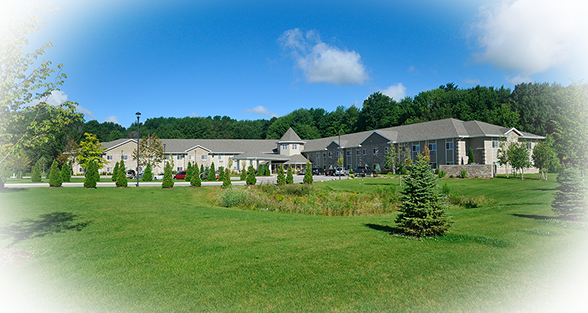Lexi Wood’s 96-year-old grandmother, Millie, moved into Emerald Bay Retirement Community & Memory Care in Brown County’s village of Hobart about two years ago.
Millie spent $96,000 on rent over two years, under the assumption that Medicaid would cover the costs after that period. Now, she is one of 15 people being evicted from Emerald Bay. Wisconsin Public Radio is only using Millie’s first name to protect her privacy.
“Her life savings is gone,” Wood said. “It’s all been paid to Emerald Bay.”
Stay informed on the latest news
Sign up for WPR’s email newsletter.
Emerald Bay sent letters to residents on Jan. 30, notifying them it will no longer accept Medicaid funding at the end of February due to rising labor costs and inflation.
That means residents participating in Medicaid’s Family Care program must move out by the end of the month.
Before its recent decision, the assisted living facility said it had to pass costs on to private pay residents, who in some cases faced 18 to 24 percent rent increases.
“The low reimbursement rates we were receiving from Medicaid have made it difficult for us to keep up with the rising costs associated with the services we provide,” Emerald Bay said in a Facebook post. “By terminating our Medicaid contracts, we will be able to offset the increased costs associated with our care and keep rent increases low and sustainable for our private pay residents.”
Emerald Bay’s decision has left families scrambling to find new homes for their loved ones in a relatively short amount of time.
“In the middle of winter, we are trying to move and transition our elderly,” Wood said. “That just speaks to the lack of value we place on our aging population in America. And then it puts the burden squarely on the shoulders of those elderly adults and their family members.”
But the situation also reflects a larger problem facing Wisconsin’s long-term care facilities related to the way providers are reimbursed for participating in Medicaid’s Family Care program.
Most long-term care services are delivered through Medicaid’s Family Care program, in which managed care organizations, or MCOs, evaluate the needs of enrolled members, arrange and pay for services. Those services can include nursing homes or assisted living facilities. Medicaid pays MCOs a monthly rate for each member, which is used to pay a reimbursement rate to services providers.
However, in many cases, MCOs have frozen or cut the rates they pay to long-term care facilities over the years, according to John Sauer, president and chief executive of LeadingAge Wisconsin, a senior living advocacy group.
“There aren’t sufficient dollars flowing to the providers, so they can cover their cost, and — in a time of severe workforce challenges — have the resources available, through the Family Care program, to increase wages and benefits to make them more competitive,” Sauer said.
“We don’t need to just freeze rates,” he continued. “We need to increase rates to address the wage and benefit pressures for caregivers and also the inflationary increases.”
At a press conference last week, Emerald Bay officials said they tried to negotiate for a better rate with their MCO, Lakeland Care, so they could retain current members, but negotiations fell through.
“We can’t keep passing on the economic crazy to our folks that are in their 80s and 90s,” said Katherine Tegen, CEO of BAKA Enterprises, Emerald Bay’s parent company. “It’s not just one community. It’s a huge issue that we’ve got to address, not just in our county (or) our state.”
In a statement, Lakeland Care Chief Operating Officer Jen Harrison said her organization was notified in December that Emerald Bay was charging its members more than the negotiated rate.
“Our provider contract does not allow for members or their families to pay above the rate agreed to and established in the contract with Lakeland Care,” she wrote. “Our residential rates are determined, negotiated and locked into a contract based on the individual needs of each member.”
Harrison said Emerald Bay asked to negotiate new rates across the board for those participating in the Family Care program.
“We worked with them to assess what would be feasible,” she wrote. “In the end, Emerald Bay asked us to pay a private-pay rate for these members, which we are unable to do as a Medicaid-funded agency.”
Families share their concerns for relatives
As of Friday, six out of the 15 Medicaid recipients had found a new retirement home, and placements are pending for another five, according to Lakeland Care.
“No member will be displaced until a safe and secure placement is found,” Harrison said. “Our Care Teams will work closely with Emerald Bay to ensure seamless coordination of care as we continue to determine next steps for each impacted resident.”
But those still looking for a new place to live may be forced to move to a different county, family members told Wisconsin Public Radio.
Wood’s grandmother, Millie, is one resident who may have to leave Brown County, which means leaving her family and health care network behind.
“I can’t even begin to imagine the toll that would have on my grandma,” Wood said. “She is such a social individual, and we are such a family-oriented group — we truly value family above all else.”
The family of Shirley Holtz, 91, faces a similar situation. Holtz moved into Emerald Bay about four and a half years ago. She paid out-of-pocket for the first two years, and moved into memory care two years ago.
Holtz’s daughter, Ann Marra, said the upcoming eviction has been a strain on the family.
“It’s devastating. It’s hurtful. It’s heartless. It’s sad. It’s confusing,” Marra said. “It’s scary for my mom, and thinking of what she’ll be going through.”
She said the family is looking at three facilities in Brown County where Holtz could potentially move, but they’re still assessing the care she would receive at those facilities.
“It’s just upsetting that somebody can control these people’s lives and just throw them in a different facility that they haven’t chosen,” Marra said. “These people have chosen (Emerald Bay) to live the rest of their life. My mom was in a good state of mind when she chose this place. She wanted to live there.”
Likewise, Rosalie Hurley, 85, spent about two years at Emerald Bay. Her daughter, Helen Johnson, said Hurley is in the memory unit and the family doesn’t know how to explain the situation to her.
“I don’t know how much she’ll understand to be totally honest,” she said. “It was hard enough moving her from her home to assisted living. And two years later, we’ve got to do it again.”
Over Hurley’s two years at Emerald Bay, she also exhausted most of her savings as she paid out-of-pocket and expected Medicaid to cover her costs after that time.
Now, many of the long-term care facilities she could move to want two years of private pay before using Medicaid, Johnson said.
“I never in a million years would have thought that we would be in this position,” Johnson said.
Is this part of a larger, statewide problem?
The case of Emerald Bay issuing discharge notices to Medicaid recipients is “an extreme example” of the financial pressure facing long-term care providers as a result of inadequate reimbursement rates, Sauer said.
But it’s a trend that could continue if things don’t improve, Sauer said. Twelve nursing homes in the state have closed since last January, according to LeadingAge Wisconsin.
“There’s no other person that the provider can appeal to, once they fail to try and convince the MCO to pay them a higher rate, so they can in-turn pay their staff and cover their bills,” Sauer said. “The only option they have is to either eat the cost and try and find some other funding source to backfill the losses created by the Family Care program.”
In December, the Wisconsin Department of Health Services sent a letter to MCOs imploring them not to decrease the rates they pay long-term care providers. The letter said the department believes MCOs have enough money to maintain or increase rates in 2023.
“It is possible that MCOs that issued large rate increases in 2022 may not have the funding to provide widespread rate increases again in 2023,” wrote Lisa Olson, Medicaid director for DHS. “However, there is no evidence that widespread rate reductions are necessary.”
Gov. Tony Evers established the Governor’s Task Force on Caregiving in 2019. In September of the following year, it released a report with recommendations on how to better support long-term care providers.
One of the recommendations was a Rate Bands Proposal, which would establish built-in increases based on annual inflation and would compensate long-term care providers for increasing caregiver wages.
“Continuing to hope that the MCOs will adequately fund care and services for the provider community is no longer an appropriate strategy,” Sauer said.
He said he believes there’s bipartisan support in the state government for solving the problem, and anticipates Evers’ biennial budget proposal will include funding for rate bands.
Without the state forcing MCOs to provide satisfactory reimbursement rates, Sauer said more long-term care providers will be forced to make tough decisions to prevent potential closures.
“History has shown that without the interventions of the governor and the Legislature, some MCOs failed to provide rate increases for periods lasting up to five years,” Sauer said. “And that’s an untenable position for providers.”
Wisconsin Public Radio, © Copyright 2024, Board of Regents of the University of Wisconsin System and Wisconsin Educational Communications Board.






